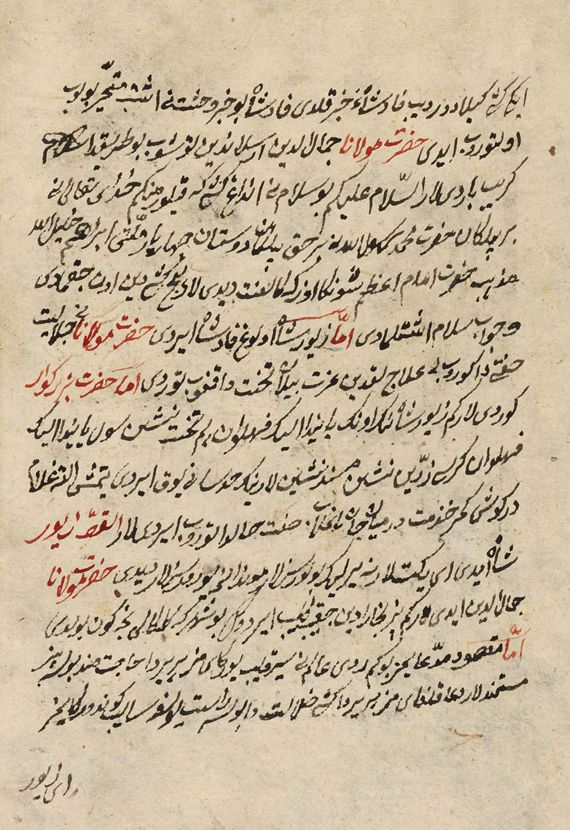folio 3 verso

folio 3 verso
ایکی کشی کیلادور دیب فادشاه غه خبر قلدی. فادشاه بو خبر و حشت نی اشتیب متّخیر بولوب
اولتوروب ایدی. حضرت مولانا جمال الدین ارسلاندین توشوب بو طریقدا سلام
کریب باردیلار. «اسّلام علیکم بو سلام نی انداغ کشی که قیلورمنکم خدای تعالی نی
بر بیلکان، حضرت محمد رسول الله نی بر حق بیلکان، دوستان چهاریار، ملتی ابراهم خلیل الله
مذهب حضرت امام اعظم، شونکا اوزکه کا لعنت» دیدی لار. هیج کشی دین اون جقمادی
و جواب سلام اشتیلمادی. امّا زیور شاه اولوغ فادشاه ایردی. حضرت مولانا نی جلالیت
صفتی دا کوروب بی علاج لقدین عزت بیلان تخت دا قفوب توردی. اما حضرت بزرکوار
کوردی لارکم: زیور شاه نینک اونک یانیدا الیک فهلوان نیم تخت نشین، سول یانیدا الیک
فهلوان کرسی زرّین نشین. مسند نشین لارنینک حد سانی یوق ایردی. یتمش الته غلام [حلقه]
درگوش، کمر خذمت درمیان جان باغلاب، صفت حالدا توروب ایردی لار. القصّه زیور
شاه ایدی: « ای یکتکار، نه یرلیک بولورسزلار؟ موندا نمه یورورسزلار؟» دیدی. حضرت مولانا
جمال الدین ایدی لار کم: « بیز بخارادین جقیب کلیب ایردوک. بو شهرکه کلکالی نجه کون بولدی
امّا مقصود مدّعایمز بوکم: روی عالم نی سیر قلیب یورکای مز. هر یردا حاجت مند بولسه بیز
مستمندلار دعا قلغای مز. هر یردا کشی ضلالت دا بولسه راست یولغه سالیب کوندورکایمز
ای زیور
folio 3 verso
two men have come”. Padshah heard this horiible news(khabar-i vaḥshat) and was sitting fearfully. Ḥażrat-i Mavlānā Jamāl al-Dīn got off the lion and expressed his greetings in this way; “Peace be upon you! I bring this greeting to the people who knows the God is one, recognizes the Prophet Muhammad as a truth(bar ḥaqq), and who are friend of “the Four Companions(chahāryār)”, people of Ibrāhīm (a friend of the God), and [one who belongs to ] the school of Ḥażrat-i Imām-i Āʻżam(=Ḥanafī school). For the others, I will put a curse.” [Then] No one made any sounds, and no answer for the greeting were heard. However, Zayūr Shāh was a great king. He saw Ḥażrat-i Mavlānā as in great quality(jalālīt? ṣifat), stood up from throne helplessly [but] with dignity. Now Ḥażrat-i Bururgvār observed: at the right side of Zayūr Shāh, there were fifty worriors sitting on the couch (nīm-takht nishīn), and at the left side, there were [also] fifty worriors sitting on the golden chair (kursī-yi zarrīn nishīn) and [the other] people sitting(masnad-nishīnlar) were countless. And the seventy-two servants stood on there with tightening their belt of service(kamar-i khiẕmat-i dar miyān -i jan??) STORY Zayūr Shāh said: “Oh youngmen, Where are you from? What are you doing here? Ḥażrat-i Mavlānā Jamāl al-Dīn said: “We came out from Bukhārā. It has been a few days since we came here. Now our will (our purpose?: maqṣūd-muddaʻāymiz) is as follows: We are wondering over the World(rū-yi ʻālem). In each place, if there are people who need us, we, poormen (mustanadlar) pray for it. In each place, if peple are in the error(deviation: ẓalālat), we urge(<köndür-) them to the righteous way.[–fol.4 recto–]